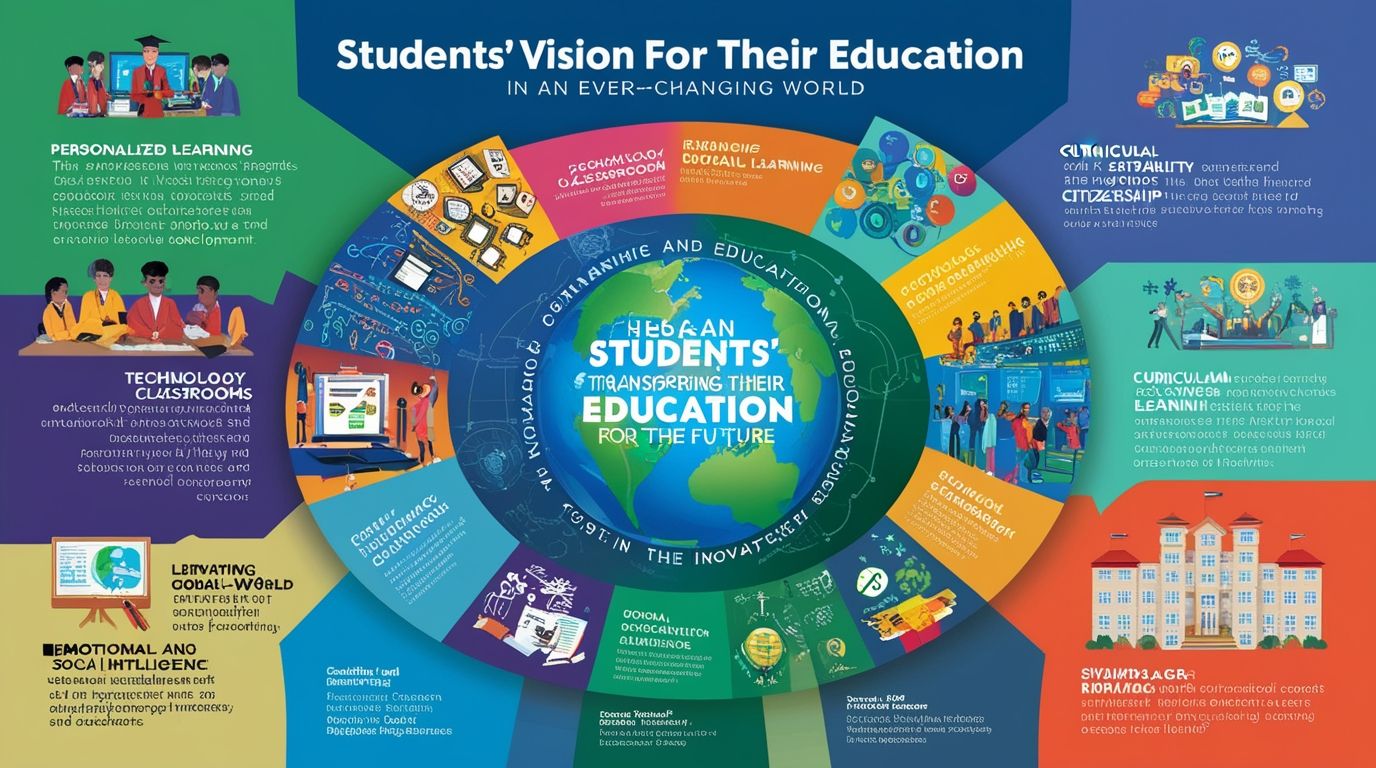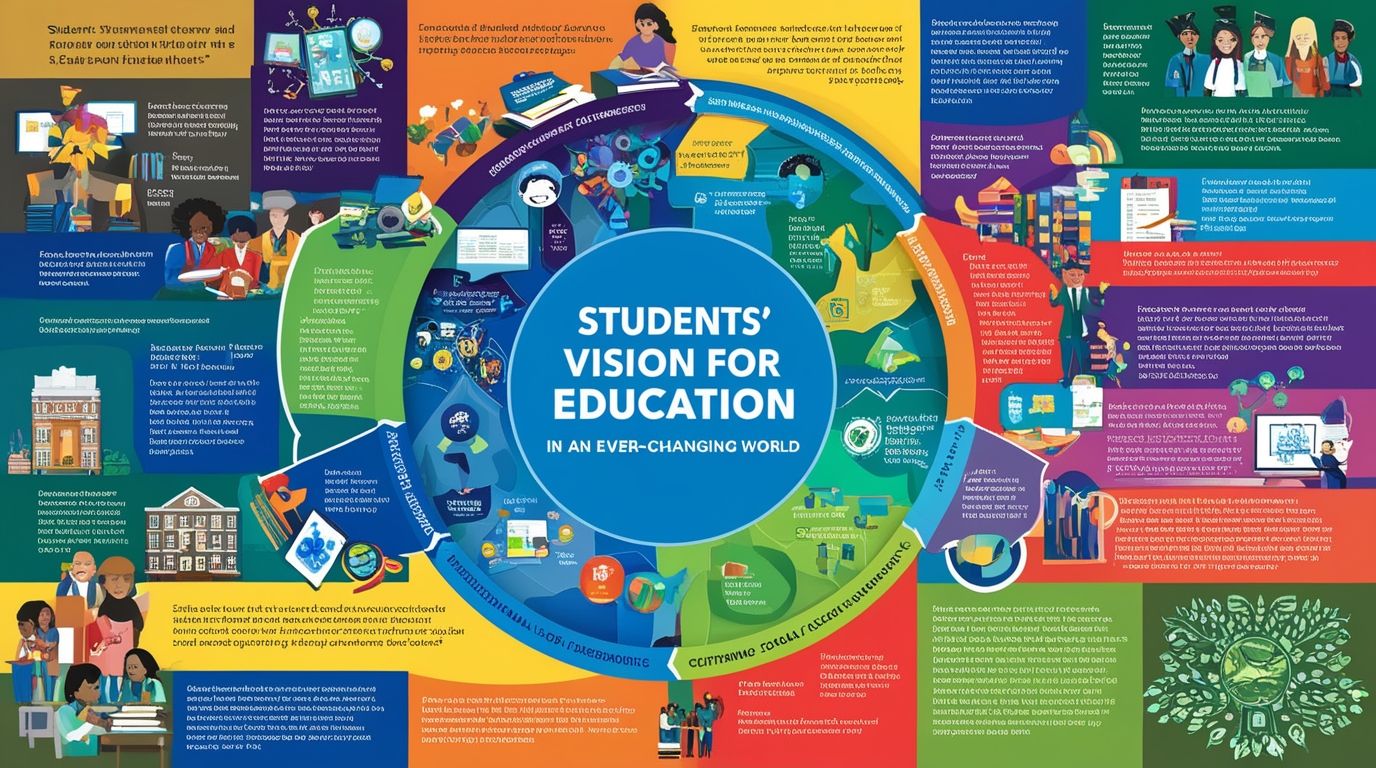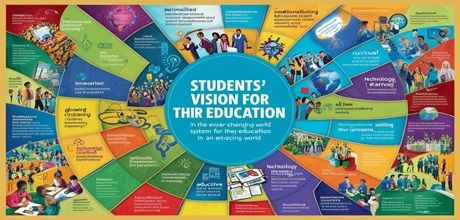Introduction
Students’ Vision for Their Education in the ever-evolving landscape of education, students today envision a system that transcends traditional boundaries, embracing innovation, inclusivity, and holistic development. This vision is a call to educators, policymakers, and society at large to reimagine education as a dynamic and responsive entity that prepares learners for an uncertain future. As we delve into students’ aspirations for their education, several key themes emerge, shaping a transformative framework that aligns with their needs and the demands of the 21st century.
Personalized Learning
One of the foremost aspects of students’ vision for their education is the desire for personalized learning. In contrast to the one-size-fits-all model, students seek a customized approach that acknowledges their unique strengths, interests, and learning styles. Personalized learning not only fosters deeper engagement but also empowers students to take ownership of their educational journey. Through adaptive technologies, personalized feedback, and individualized learning plans, students can progress at their own pace, ensuring a more meaningful and effective learning experience.

Integrating Technology
Technology plays a pivotal role in shaping students’ vision for their education. In an increasingly digital world, students recognize the importance of technological fluency as a foundational skill. They envision classrooms equipped with cutting-edge tools that facilitate interactive and immersive learning experiences. Virtual reality (VR), augmented reality (AR), and artificial intelligence (AI) can transform traditional teaching methods, making learning more engaging and accessible. Furthermore, technology enables remote learning, breaking geographical barriers and providing opportunities for global collaboration.
Emphasizing Critical Thinking and Problem-Solving
Students envision an education system that prioritizes critical thinking and problem-solving skills over rote memorization. They understand that in a rapidly changing world, the ability to analyze complex issues, think creatively, and develop innovative solutions is crucial. By incorporating project-based learning, interdisciplinary studies, and real-world applications into the curriculum, educators can cultivate these essential skills. Students want to be challenged with meaningful problems that encourage them to think deeply and collaborate with peers, preparing them for future careers and civic responsibilities.

Fostering Emotional and Social Intelligence
Another significant aspect of students’ vision for their education is the emphasis on emotional and social intelligence. Recognizing the importance of mental health and well-being, students advocate for a holistic approach that nurtures both the mind and the heart. They envision schools as safe and supportive environments where emotional literacy, empathy, and interpersonal skills are actively taught and practiced. Programs that promote mindfulness, conflict resolution, and positive relationships are essential in helping students develop resilience and a sense of community.
Cultivating Global Citizenship
In an interconnected world, students aspire to be global citizens who are aware of and engaged with global issues. They envision an education that fosters cultural awareness, empathy, and a sense of responsibility towards the global community. This involves integrating global perspectives into the curriculum, encouraging language learning, and promoting international exchange programs. By exposing students to diverse cultures and viewpoints, education can broaden their horizons and inspire them to contribute positively to the world.
Promoting Sustainability and Environmental Stewardship
Students today are acutely aware of the environmental challenges facing our planet. They envision an education system that not only imparts knowledge about sustainability but also actively involves them in environmental stewardship. Schools can become hubs of eco-friendly practices, from energy conservation to waste reduction, serving as living laboratories for sustainable living. Integrating environmental education into all subjects and encouraging student-led initiatives can empower young people to become advocates for a sustainable future.
Encouraging Lifelong Learning
The concept of lifelong learning is central to students’ vision for their education. They understand that learning does not end with graduation but continues throughout life. To support this, they envision an education system that instills a love for learning and equips them with the skills to adapt to changing circumstances. Flexible learning pathways, opportunities for continuous professional development, and access to diverse learning resources are crucial in fostering a culture of lifelong learning.
Ensuring Equity and Inclusivity
Equity and inclusivity are fundamental to students’ vision for their education. They advocate for an education system that provides equal opportunities for all, regardless of socio-economic background, race, gender, or ability. This includes addressing disparities in funding, resources, and access to quality education. Students envision schools that celebrate diversity, promote inclusivity, and implement policies that ensure every student can thrive. Support systems for marginalized groups, inclusive curricula, and diverse representation in teaching staff are essential components of this vision.

Engaging Families and Communities
Students recognize the importance of engaging families and communities in the educational process. They envision a collaborative approach where parents, guardians, and community members are actively involved in supporting students’ learning and development. Schools can create partnerships with local organizations, businesses, and cultural institutions to provide students with real-world learning opportunities and support networks. By fostering strong connections between schools and communities, education becomes a shared responsibility and a source of mutual enrichment.
Rethinking Assessment and Accountability
Traditional assessment methods, such as standardized testing, often fail to capture the full range of students’ abilities and potential. Students envision a more holistic approach to assessment that values diverse skills and achievements. This includes formative assessments, project-based evaluations, and portfolios that showcase students’ progress and accomplishments over time. Moreover, accountability systems should focus on continuous improvement rather than punitive measures, encouraging schools to innovate and adapt to meet students’ needs.
Conclusion
Students’ vision for their education is a compelling blueprint for a transformative future. It calls for an education system that is personalized, technologically advanced, and centered on critical thinking, emotional intelligence, and global citizenship. It emphasizes sustainability, lifelong learning, equity, and inclusivity while fostering strong connections between schools, families, and communities. By rethinking assessment and accountability, we can create an education system that truly prepares students for the complexities and opportunities of the 21st century.
This vision is not merely aspirational; it is achievable with collective effort and commitment. Educators, policymakers, and society must listen to students’ voices and collaborate to bring this vision to life. In doing so, we can build an education system that empowers every student to reach their full potential and contribute meaningfully to the world.

Dear, M. Jan
Thought provoking ideas were highlighted. great intellectual effort. really impressed to read this text.
4mjntv
zov145
ncyjc0
I really like your blog.. very nice colors & theme. Did you make this website yourself or did you hire someone to do it for you? Plz reply as I’m looking to construct my own blog and would like to know where u got this from. appreciate it
7bjm6y
mdjf3i
I have been surfing online more than three hours as of late, but I never discovered any attention-grabbing article like yours. It is pretty price enough for me. Personally, if all webmasters and bloggers made just right content as you did, the internet can be much more useful than ever before.
Nice read, I just passed this onto a colleague who was doing a little research on that. And he just bought me lunch because I found it for him smile So let me rephrase that: Thanks for lunch!
Thank you for the sensible critique. Me & my neighbor were just preparing to do a little research on this. We got a grab a book from our local library but I think I learned more clear from this post. I am very glad to see such fantastic info being shared freely out there.
Have you ever thought about creating an e-book or guest authoring on other sites? I have a blog based on the same subjects you discuss and would really like to have you share some stories/information. I know my audience would value your work. If you’re even remotely interested, feel free to send me an email.
I simply couldn’t go away your website prior to suggesting that I actually loved the standard information a person supply on your visitors? Is going to be again frequently to investigate cross-check new posts
I’ve read a few good stuff here. Definitely value bookmarking for revisiting. I wonder how so much effort you put to make this type of magnificent informative site.
Hello just wanted to give you a brief heads up and let you know a few of the images aren’t loading properly. I’m not sure why but I think its a linking issue. I’ve tried it in two different internet browsers and both show the same outcome.
I’m usually to running a blog and i really admire your content. The article has actually peaks my interest. I am going to bookmark your site and keep checking for brand spanking new information.
You completed certain good points there. I did a search on the matter and found nearly all people will agree with your blog.
You are my breathing in, I have few blogs and very sporadically run out from post :). “No opera plot can be sensible, for people do not sing when they are feeling sensible.” by W. H. Auden.
There are actually a lot of details like that to take into consideration. That is a nice point to convey up. I provide the thoughts above as general inspiration however clearly there are questions like the one you carry up the place the most important factor will be working in sincere good faith. I don?t know if finest practices have emerged round things like that, however I am sure that your job is clearly recognized as a good game. Each boys and girls really feel the impression of only a second’s pleasure, for the rest of their lives.
What i do not understood is in reality how you’re not actually a lot more smartly-favored than you may be now. You’re so intelligent. You know thus significantly relating to this subject, made me personally consider it from numerous various angles. Its like men and women don’t seem to be involved until it is one thing to accomplish with Woman gaga! Your personal stuffs excellent. At all times deal with it up!
I’ve been browsing on-line greater than three hours these days, but I by no means found any attention-grabbing article like yours. It is beautiful price enough for me. In my opinion, if all site owners and bloggers made excellent content as you did, the internet will likely be a lot more helpful than ever before.
You completed a few fine points there. I did a search on the subject and found nearly all persons will consent with your blog.
I have been browsing on-line greater than 3 hours nowadays, yet I never found any interesting article like yours. It is lovely worth enough for me. In my opinion, if all webmasters and bloggers made excellent content as you did, the net shall be a lot more useful than ever before.
Regards for all your efforts that you have put in this. very interesting info .